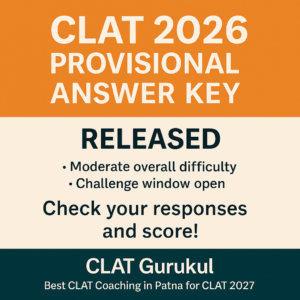
Border Dispute Between Thailand and Cambodia: A Detailed CLAT 2026 Analysis
CLAT Current Affairs 2026 | International Law | Legal Reasoning
Brought to you by CLAT Gurukul – the best online coaching for CLAT
Why in News
On July 2, 2025, The Indian Express reported that Thailand’s Constitutional Court had suspended Prime Minister Paetongtarn Shinawatra from office. The reason? A leaked phone call that took place between her and Cambodian Senate President Hun Sen. This leak triggered a massive political and legal firestorm in Thailand, raising ethical concerns about the PM’s conduct and worsening the already tense border dispute between Thailand and Cambodia.
The issue has significant international law implications, with discussions involving the International Court of Justice (ICJ), bilateral mechanisms, sovereignty claims, and historical grievances. Hence, this story is not just political drama—it’s a legal, ethical, and constitutional issue of global relevance, especially for CLAT 2026 aspirants studying geopolitics and international law.
The Leaked Call – What Sparked the Crisis
- On June 15, 2025, PM Paetongtarn Shinawatra spoke with Cambodian Senate President Hun Sen via phone.
- Hun Sen later leaked the call by posting a Facebook message in which he claimed to have recorded the conversation and shared it with over 80 individuals.
- In the conversation (translated), they discussed:
- Rising border tensions
- Whether restrictions imposed after a deadly clash should be lifted
- Thai military criticism of Cambodia
- Paetongtarn referred to Hun Sen as “Uncle”, given their close political family connections. Her father, Thaksin Shinawatra, a former PM, was an ally of Hun Sen.
- She told Hun Sen she would “try to manage” the army’s opposition.
- Critics in Thailand accused her of compromising national security by discussing internal army issues with a foreign leader.
- The Constitutional Court took note and suspended her pending an ethics investigation.
The Border Dispute – A Historical Overview
🔹 Origins of the Conflict
- The dispute centers around a contested border zone, especially near the Preah Vihear Temple, a 1,000-year-old Hindu temple.
- Cambodia uses a French colonial map to claim territory, while Thailand disputes its accuracy.
- In 1962, the International Court of Justice (ICJ) ruled that the temple lies in Cambodian territory.
- However, Thailand argues the ICJ ruling does not apply to surrounding land or military presence.
- Multiple skirmishes have erupted in recent decades—both sides claim self-defense during armed exchanges.
🔹 May 2025 Escalation
- In May 2025, Thai and Cambodian forces exchanged fire, escalating fears of a renewed military conflict.
- Cambodian soldiers died; both countries claimed the other initiated the violence.
- This led to domestic unrest in Thailand and raised questions about how the Thai government was managing border defense.
What Happens Next – Legal and Diplomatic Paths
- Cambodia wants the dispute back before the ICJ, including the events surrounding the May 2025 clash.
- Thailand refuses, arguing:
- The ICJ does not have jurisdiction over the current conflict.
- All such matters must be handled through bilateral mechanisms.
- Cambodia has already filed fresh submissions to the ICJ.
- This international legal standoff could result in:
- Temporary injunctions from ICJ
- Diplomatic pressure from ASEAN or the UN
- Worsening of bilateral ties if no resolution is reached
Bickering Neighbours – Thailand and Cambodia’s Complex History
- The nations have historical mistrust, deeply rooted in colonial boundaries and national pride.
- Cambodia insists on French colonial maps as legitimate; Thailand rejects them.
- Preah Vihear Temple, while geographically near the border, is symbolically vital to both nations.
- This is not the first such crisis. In the 1970s, during Cold War instability, tensions over sovereignty and border fencing surfaced.
- Nationalist leaders on both sides often invoke patriotic emotions when conflict arises, adding public pressure to legal negotiations.
Key Terms for CLAT Aspirants
Term | Explanation |
Preah Vihear Temple | A 1000-year-old temple at the heart of the Thailand-Cambodia border dispute. |
ICJ (International Court of Justice) | UN’s judicial body resolving disputes between nations. Gave 1962 ruling in favor of Cambodia. |
Bilateral Mechanism | A diplomatic resolution framework involving only the two concerned nations. |
French Colonial Map | A map drawn during French rule of Cambodia (late 19th – early 20th century) used by Cambodia to assert territorial claims. |
Ethics Investigation | Legal inquiry into a public official’s moral and constitutional conduct. |
Constitutional and Legal Relevance
🔹 Thailand’s Constitution
- Thailand’s Constitutional Court is empowered to suspend or dismiss public officials for violating:
- National security
- Ethical conduct
- Military confidentiality
- PM Paetongtarn’s suspension highlights how executive power is checked by constitutional law.
🔹 International Law and Sovereignty
- Under the UN Charter, countries can approach the ICJ for legal arbitration.
- Thailand’s rejection of ICJ jurisdiction may stem from:
- National sovereignty concerns
- Political distrust of international adjudication
- Cambodia insists that ICJ is the only impartial platform available.
🔹 Legal Principles at Play
- Res Judicata: ICJ’s 1962 judgment is binding, but Thailand disputes its scope, not validity.
- State Responsibility: If a state knowingly escalates border tension, it could be held responsible under international law.
- Non-Intervention: Discussing domestic army matters with a foreign leader may breach national security protocols.
Final Thoughts: Diplomacy, Law, and Public Accountability
The Thailand-Cambodia conflict reminds us that geopolitical disputes are rarely only about maps — they are about memory, emotion, law, and leadership. In this case, a phone call led to a prime minister’s suspension, highlighting the delicate interplay between law, politics, and international relations.
For CLAT 2026 aspirants, this is a prime example of how constitutional law, ethics, and foreign policy intersect — and how even one conversation can become a national and international legal flashpoint.




